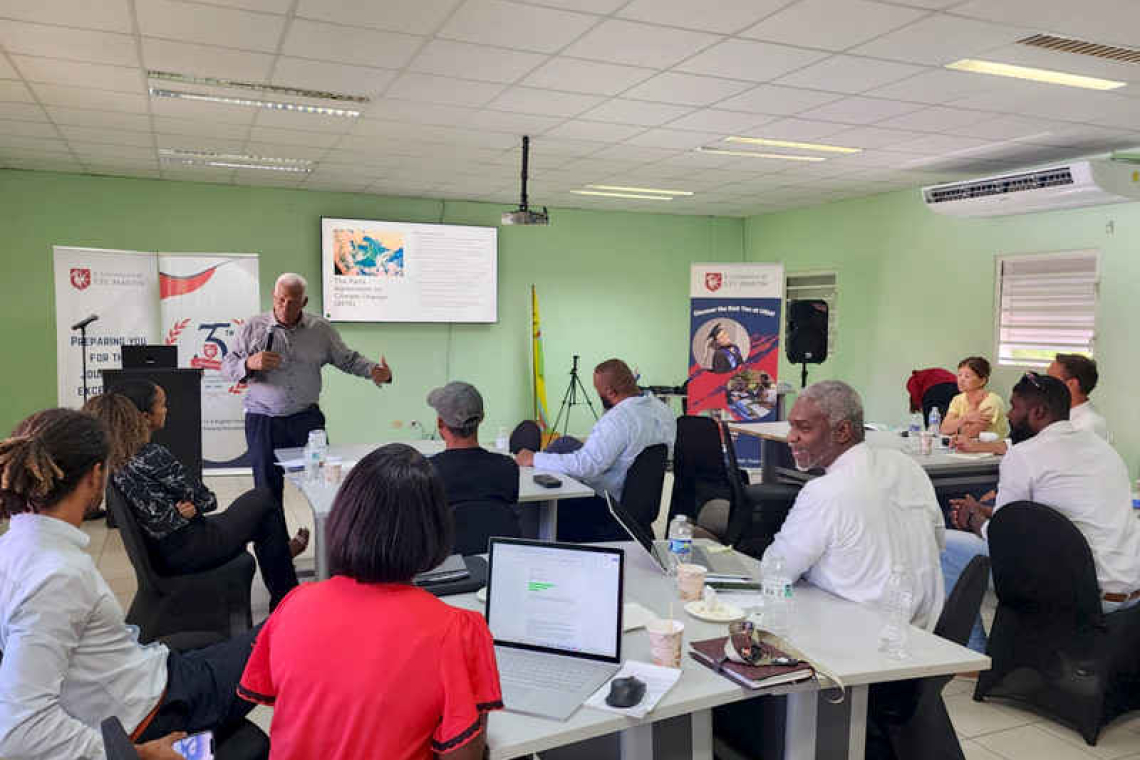A scene during the workshop.
POND ISLAND--The University of St. Martin (USM), in collaboration with the Climate Adaptation Services Foundation (CAS), the Ministry of Public Housing, Spatial Planning, Environment and Infrastructure VROMI, and the Territorial Unit of Saint-Martin and Saint-Barthélemy DEAL, hosted two days of dialogue and shared learning during the Climate and Disaster Risk Reduction Workshop, which opened on Wednesday, June 25, at USM’s campus.
Held under the theme, “How safe and protected are the people of St. Martin in the face of climate change?” the workshop brought together a wide range of voices from both sides of the island. Participants included government officials, civil servants, community leaders, educators, environmental experts, and concerned residents, all focussed on building a more climate-resilient St. Martin.
The opening evening began with a welcome and protocol led by USM Research Coordinator Raymond Jessurun. Opening remarks followed from USM President Dr. Antonio Carmona Báez, Acting Minister of VROMI Melissa Gumbs, Prime Minister Dr. Luc Mercelina, and Second Vice President of the Collectivité, Bernadette Davis.
Setting the emotional and cultural tone for the evening, USM faculty member and acclaimed poet Rochelle Ward shared captivating stories rooted in the lived experiences of St. Martiners. Both in-person and video testimonies from residents painted a vivid picture of the impact of hurricanes, flooding, and ongoing climate risks, reminding attendees that the data and policies discussed must always reflect real human lives.
Day two of the workshop shifted into interactive, solutions-focussed discussions. Representatives from the Office of Disaster Management, the Ministry of Public Health, Social Development and Labor VSA, the Windward Islands Federation of Labour (WIFOL), the Department of Interior and Kingdom Relations BAK, VROMI, the Meteorological Office, the Collectivité, the Nature Foundation, and others examined St. Martin’s progress towards the 2030 Sustainable Development Goals (SDG’s), the Sendai Framework for Disaster Risk Reduction, and the Paris Agreement.
A key highlight was the introduction of the St. Martin Climate Impact Atlas, a new community tool designed to identify and map climate-related risks across the island. Participants provided feedback on the draft version, sharing ideas for strengthening the Atlas and ensuring it represents and includes local realities. Many congratulated the teams for arranging the session for its hands-on nature and for giving the community a genuine voice in shaping climate adaptation strategies.
Throughout the workshop, the importance of collaboration, knowledge-sharing, and storytelling was clear. From government agencies and NGOs to everyday citizens, the workshop emphasised building a resilient St. Martin will require everyone’s input and action.
The final session of the workshop took place on Friday, June 27, from 9:00am to 12:00pm at USM, where participants were to co-create a visual mind map of St. Martin’s climate challenges and possible community-driven solutions. This will directly inform the finalisation of the Climate Impact Atlas.
Jessurun encouraged residents, organisations, and especially the youth to attend and help shape the future: “This is about creating something together that speaks to our island’s reality. Everyone’s input matters.”
USM thanked all partners and participants who made the first two days a success.







